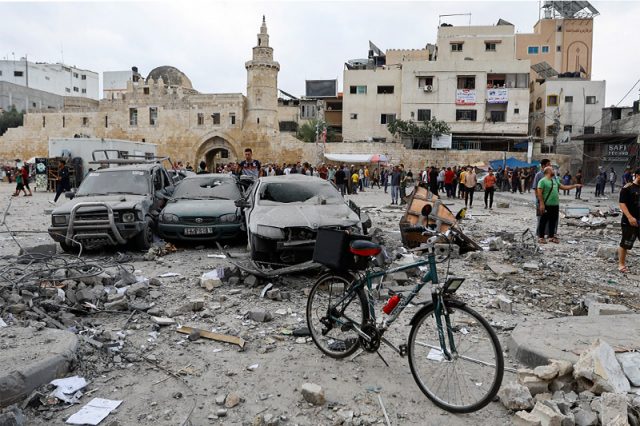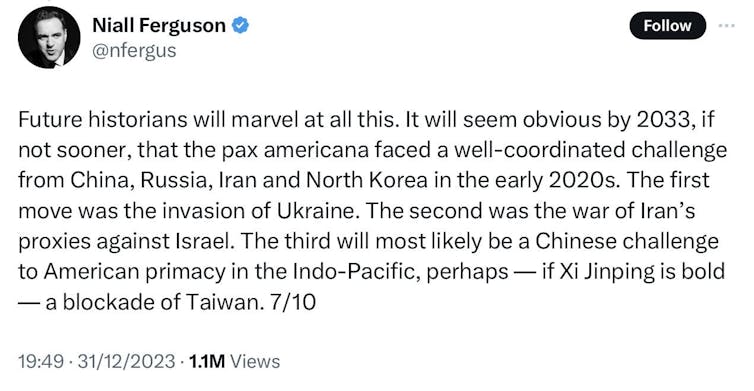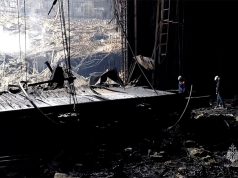
How worried should European citizens be in countries that have come to expect unprecedented levels of security and safety? If the many warnings currently circulating are to be believed, then the answer looks grim.
Leaked documents from Germany’s defense ministry suggest that Berlin is expecting Russia to extend the war that began in Ukraine in 2022 into Europe by 2025, forcing a major conflict with Nato. There are concerns that Russia will “escalate to de-escalate”, launching an attack that will be so shocking that liberal states will accept the new world order that Vladimir Putin wants to create as his legacy.
Swedish politicians have warned their citizens to prepare for the possibility of war on their territory. Others – such as the historian Niall Ferguson – suggest that what we might be seeing is a series of global events that reveal a coordinated attempt to reshape the world order.

So, how concerned should we be about the possibility of future global chaos and disorder unlike anything most of us have experienced?
Deterrence and interdependence
One place to begin any discussion about the prospect of war is with the theory and practice of deterrence. Simply put, states usually try to deter other states from acts of war and aggression. Many will argue that the reason “great powers” do not fight each other directly is because the costs are too high. The risks of nuclear confrontation, for example, are simply too horrific to contemplate.
But another aspect of international security is what we might call deterrence by entanglement. On this view, international “frenemies” may be too interconnected to launch attacks where their children might be studying, or where they have investments in property and infrastructure.
There are few geopolitical or territorial ambitions that are worth the international chaos of a world war or nuclear conflict. It would mean – for most in the west, at least – the destruction of a “good life” that was unimaginable to previous generations. While there might be wars on the “edges” of world order, few leaders wants to destroy their investments and the possibilities for enjoying the fruits of globalization.
‘Grey zone’ conflicts
It might also be the case that the scale or level of international conflict has changed. One of the influential debates in the past 15 years has been on what some describe as the “grey zone” of international conflict – actions and threats that are just under the threshold that will lead to war between nations.
Some argue that much of what we’ve seen occurring recently represents sub-threshold problems of international politics. In the response to the invasion of Ukraine, the US and its allies have constantly warned about escalating the conflict above the threshold that would take us into a war between Nato and Russia.
We can expect lots of stories and declarations about what is looming on the “threat horizon”. But these are all tactics in the information war that is vital to all conflicts in the digital grey zones of the 21st century.
As the 2023 film Leave the World Behind warns, we should expect attempts to create uncertainty and domestic unrest through the use of fake news, disinformation and conspiracy theories, and acts of cyber-sabotage. We should expect constant waves of cyberattacks on institutions and organizations – indeed, this is already happening on a daily basis in the liberal world.
Simply put, war in liberal states will not look like a rerun of second world war movies or the dystopian sci-fi war games we play. But the wars fought outside the liberal world, sadly, are likely to continue to be a mix of the worst suffering and destruction from previous centuries. They will, though, be fought with tactics and technologies that increasingly resemble the most dystopian and futuristic war movies and games.
I discuss these possibilities for future wars in my book, Theorising Future Conflict: War Out to 2049. This is the year in which the Blade Runner sequel is set – and the year that China supposedly wants to rival the US in military power.
Time to dig a bunker?
So, should we all be looking for the nearest bunker in which to hide from the coming chaos that will hit before the end of the decade? American psychologist Steven Pinker might be correct in the short term about life becoming safer for the citizens of liberal democracy. Deterrence by entanglement might prevent the escalation of war in Europe and beyond. However, looking beyond the 2020s, it is harder to predict what world order (or disorder) will look like in a time of artificial intelligence and climate emergencies.
Prediction is always a risky business in war and international politics. We might be in a geopolitical moment where all our assumptions and expectations change in the ways imagined by Leave the World Behind and Civil War, the upcoming movie by Alex Garland which envisages an America riven by armed conflict.
But while the world might be in a moment of dramatic and uncertain transformation, congested with new actors, technologies, tactics and terrains, there might be one timeless lesson from the history of war and international politics. Politicians and policymakers make strategic errors and miscalculations which can have unforeseen consequences.
So, it might be the time to follow the tech billionaires in building a bunker – if you have the money to spare. But as you plan your survival strategy, consider that if global conflict does escalate, it probably wont look like anything experienced before now.![]()
Mark Lacy, Senior lecturer, Politics, Philosophy, and Religion, Lancaster University. This article is republished from The Conversation under a Creative Commons license. Read the original article.









